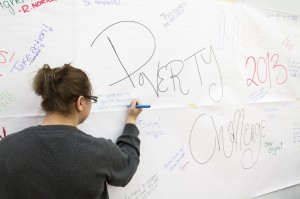 [1]
[1]Brandi Belliveau, a first-year student in the Child and Youth Worker program, writes down what she learned from the Poverty Challenge on a graffiti wall. Photo by Tyson Leonard.
By Tyson Leonard
BELLEVILLE – Imagine you are a single parent of three; you’ve lost your job, and are about to be evicted. You don’t know if you’re eligible for social assistance, and you don’t know how you’ll support your family without it. That’s what over 100 students in Loyalist College’s Child and Youth Worker program were asked to do Wednesday at the program’s first Poverty Challenge.
Students were each assigned a role to play that was based on the experiences of someone living in the Quinte community. They then had to navigate through various mock social agencies set up around the college.
“The Poverty Challenge is an opportunity for students to go through an experiential workshop – to put themselves into a position where they may experience what life might be like for someone who has to live in poverty, what the everyday struggles are,” said Lisa Shunock, Co-ordinator of the Child and Youth Worker program.
This is the first year the program has run a poverty awareness event this large. Shunock said she hopes it will become an annual event.
“We are hoping that it’s going to raise awareness among our students about poverty, and help our students understand the role of advocating for others to ensure that children and families are not living in poverty in our communities,” she said.
Megan Butler, a first-year student in the program, said the Poverty Challenge opened her eyes to what poverty really looks like.
“I was never really touched by poverty, so coming into this I didn’t have a clue about what poverty really was,” said Butler.
“When we actually got to meet the people our characters were based off of, that’s when it really hit home. These people are real and they exist around us everywhere.”
One of the biggest shocks to Butler was being denied services she had always assumed were easy to come by.
“We were going around to the different areas and we were not able to see the services. Or to be shot down by the services and not receive the things you need to survive” was frustrating, she said.
“If everyone could know a little bit more about poverty then it would make us all better people.”
Kayla Clouthier, a third-year student in the Child and Youth Worker program, was one of the mock workers at a social-assistance booth.
“You perceive poverty as a choice, or you perceive it as something that would be very obvious to you if you saw it, and it’s not – it’s everyday people, anyone living on a service wage, or in a temp position. These are students, these are people that you know,” said Clouthier.
During the speakers corner segment of the Poverty Challenge, Clouthier talked to the first-year students who participated in the challenge. She said a lot of the students had never seen poverty first hand.
If the students were to learn only one thing it should be that poverty affects us all, whether directly or indirectly, Clouthier said.
“It’s about listening to their story and acknowledging the fact that they’re human beings – that they matter, and that it could just as easily be you.”